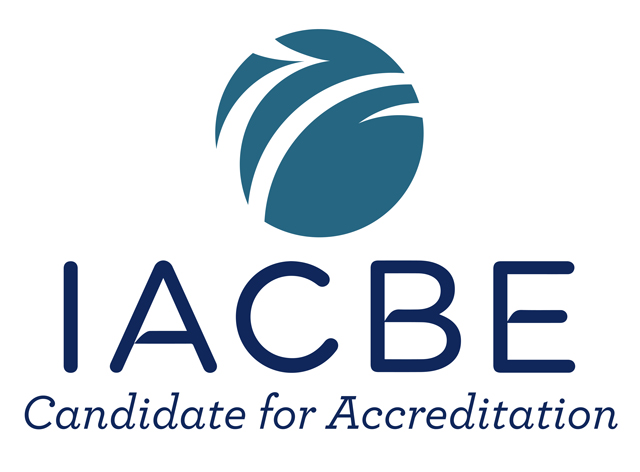Master of Business Administration in International Business (MBA-IB)
Acquire the skills you need to lead global businesses.
Apply business, marketing, and human resource best practices to an expanding global market with a unique Master of Business Administration in International Business (MBA-IB) from St. George’s University (SGU).
Ideal for business leaders and managers looking to advance in their careers, our unique IB Program goes beyond the fundamentals, to explore start-up and expansion strategies across cultural and geographic boundaries. Learn how healthy organizations thrive in emerging economies while creating socioeconomic health in local communities.
MBA-IB Program Overview
As a student in the program, you will build on your career to enhance your managerial skills and gain international experience. This 18-month, 48-credit MBA-IB Program is taught primarily in online classrooms to experienced managers and professionals. This allows real-time interaction between students and their professors.
- Class Sessions: Participants take two (2) courses at a time during an eight-week period. That is one (1) evening a week for each course session. These live sessions are typically held on Tuesday and Thursday evenings, with some additional “face-time” required in different classes.
- Live Online Learning Tools: The MBA Programs utilize advanced online learning tools (Sakai, Zoom, and Panapto) to create its live virtual classroom environment that allows the professors, course participants, and guest speakers to meet in a virtual space, regardless of their physical location. Each online class session is delivered in a classroom-like setting and may use group discussion, team dialogue, private electronic discussion groups, presentations, and web videos to address case studies and preparation work. Both professors and participants will appear “live” using video and audio technology. The latest information and social technology tools are used throughout the program to facilitate relationships and information sharing, as well as empower participants to fully engage within the global networked marketplace.
- Self-Paced Introductory Coursework: Prior to the initial residency, participants must complete the MBA Onboarding coursework in the areas of accounting, finance, communication (written and oral), among others. Available as short online courses, this preparatory material, is meant to provide a strong leadership and management foundation which is vital for the first residency and later in the Program; particularly for the second residency’s Capstone Project. These projects are designed to encourage students to think critically, solve challenging problems, utilize the knowledge learned in various courses, and enhance their research, communication, and presentation skills.
- Residencies in Grenada: Students complete a pair of one-week, non-consecutive residencies at SGU’s True Blue campus in Grenada. The residencies are five (5) full days (Monday morning through Friday evening), and all sessions are mandatory for participants. This Initial (or Start-up) Residency sessions at the beginning of the MBA Program allow participants to meet, work together in teams, experience Grenada, and build strong relationships that could last a lifetime. Numerous team-building and fun events, as well as “living case studies” are incorporated into the Residence Schedule, bringing Grenada’s local culture, cuisine, and business environment to the academic experience. The second Residency takes place at the end of the Program where participants complete and present their Capstone Project. Participants are encouraged to bring their spouse or significant other to the Faculty Networking Activities and the presentation of their Capstone Projects.
- Capstone Project: At the conclusion of their study, during the Final Residency Week, participants come together with their cohort, in teams to present their final projects and celebrate their educational success through a Capstone Project. This provides students with the opportunity to integrate all their MBA training, knowledge, and skills into a real-world business setting of personal value and meaning as they are primarily developed through individual course assignments throughout the program. The MBA faculty provides ongoing guidance and direction.
MBA-IB Program Learning Outcomes
ISLO-1: Students will be able to analyze and evaluate complex business problems and make sound decisions.
ISLO-2: Students will be able to integrate teamwork, and interpersonal relationship skills necessary to collaborate ethically and socially responsibly in a global business environment.
ISLO-3: Students will be able to apply and transform advanced oral and written communication skills necessary for success in diverse business environments.
ISLO-4: Students will be able to synthesize business knowledge, skills and tools in an international business and management context.
ISLO-5: Students will be able to adapt computer software, web, and social media skills to communicate and to operate in the international business environment.
ISLO-6: Students will be able to evaluate educational research and create reflections of personal leadership and effective management skills.
Courses Offered
BUSI 898 – MBA Onboarding – Initial Residency Course - (0 credit)
This course provides students with the necessary experience and orientation to the online MBA Programs as they are exposed to specific course content through online training modules, assessments, and evaluations. Additionally, through the exposure of the resources listed in the ‘Course Syllabus,’ students are enabled to navigate and maximise their skillsets towards successful completion of their courses. Consequently, they will identify and strengthen areas of weakness to be effective graduate students.
BUSI 853 - Leadership & Management for International Business – Initial Residency Course - (3 credits)
As leaders and managers, you will be responsible for building and sustaining healthy organizations that fulfill the needs of customers, employees, investors, and other stakeholders. You will be faced with conflicting priorities; changing economic, political, socio-cultural, and technological forces in the world around you and be required to continually develop organizational capabilities in response to these changing forces. To meet these challenges, you will need to understand yourself and your responsibilities as a manager and become a leader who can adapt to the specific needs of the situation and constituents affected. Therefore, developing a solid foundation of knowledge about leadership qualities and your traits and preferences will help you become a better leader and manager. You will be completing an assessment tool (the Myers-Briggs Type Indicator – MBTI), as part of this residency, and using the results to help you determine the skills you will need to accomplish your professional goals. Ultimately, you will be motivated to develop a personal leadership development plan for the program.
BUSI 880 - Critical Analytical Business Thinking (2 credits)
BUSI 880 helps students to learn and practice skills that transcend any single discipline or function of management. Students explore business issues while developing analytic and persuasive skills in addressing environmental, organizational, relationship, and personal issues. Moreover, this course helps participants identify critical questions to dissect and prioritize issues, develop reasoned positions, and make compelling arguments.
BUSI 896 - Ethics and Management (1 credit)
Leaders have a responsibility and a duty to “do the right thing” using an awareness of their own and others’ ethical viewpoints. This course explores the numerous ethical duties faced by organizations and managers. Utilizing analytical frameworks and the latest findings on human behavior, participants will explore a wide range of ethical decisions and strategies, many with paradoxical and conflicting perspectives. These will help reveal and assess personal and ethical intuitions, assumptions, and frameworks to compare them with explicit modes of formal ethical thoughts, and examples of how to use ethics in business scenarios.
BUSI 844 - Lessons in Global Development (2 credits)
This course offers an overview of the strategic and operational opportunities and challenges for SMEs within emerging economies seeking to compete within the global marketplace. It examines the successes and failures of firms in numerous emerging economies, paying special attention to the role of public institutions and public/private partnerships and programs in the socio-economic development process. Therefore, this course highlights the role of personal, organizational, and social capacity building through SMEs in responding to change and creating financial, social, environmental, and human wealth.
BUSI 854 - Innovation and Entrepreneurship (3 credits)
The Innovation and Entrepreneurship course empowers participants with the knowledge, skills, and tools of innovation management and entrepreneurship to solve problems and create value. It starts from the premise that everyone is creative, and innovation is necessary to create a competitive advantage in a fast-paced and transforming marketplace. An ‘idea’ is nothing without a plan. Using this methodology, managers learn to combine creative ideas with market analysis and an implementation plan in order to successfully launch a business or a not-for-profit organization.
BUSI 888 - Managing Information (3 credits)
In a globalized networked economy, the acquisition, storage, retrieval, and use of information are important. Consequently, this course was created to provide a foundation to prepare participants to become managers and consultants who rely upon information technology to accomplish organizational objectives. Therefore an overview of technology solutions, and discussions of the latest trends in business informatics, including: data management, e-commerce, social media, networking, databases, cloud computing, knowledge management, software and hardware trends, privacy, security, and ethical issues are explored.
BUSI 859 - Project Management (2 credits)
Virtually all organizations use Project Management (PM) to accomplish specific tasks, implement improvements, reach new markets, and innovate. Project success directly impacts the ability to achieve financial performance and gain career promotions, and serves as the foundation to deliver healthy, cultural environments and meaningful work. This course will teach the concepts and techniques of project design, management and assessment, and develop skills applicable to a variety of projects within international business.
BUSI 889 - Global Strategy and Strategic Management (3 credits)
Strategy is the heart of business performance, yet a strategy is difficult to develop and even harder to implement. This course looks at how firms in emerging economies formulate and implement business strategies that create value in their local, as well as global marketplaces. Utilizing numerous firm studies within emerging economies, and well-tested frameworks, students learn the key ingredients of strategy, think through challenges, and develop the capacity to provide alternative and anticipated impacts, and gain lessons they may apply to their own organizations. Under the umbrella of cultivating strategic thinking and decision-making, we will develop three (3) critical skill areas:
1) Analysis of strategic goals (vision, mission, and strategic objectives).
2) Managerial decision-making (broadly asking, “What industries should we compete in?” and “How should we compete in these industries?”).
3) Taking actions needed to implement strategies (allocation of resources and organizational design).
BUSI 881 - Research Methods and Data-Driven Decision-Making (2 credits)
Successful, performance-oriented, leaders and managers know how to do good research necessary to make an array of decisions: selecting new markets, partners, products, or services; sourcing, developing, and launching innovations; understanding customer requirements or analyzing alternative strategic changes; and developing marketing research strategies and surveys. Accordingly, this course examines the rudiments of decision theory, decision trees, and qualitative and quantitative research methods, while actively using case studies, research methods, and other tools critical to formulating decisions. Research questions are drawn from marketing, finance, operations management, and other management functions within a broad set of industries.
BUSI 826 - Managerial Economics (3 credits)
Managerial Economics stresses the importance of incentives as determinants of human behavior and performance, and emphasizes the consideration of costs and benefits as an efficient method for reaching managerial decisions. The course bridges theory and practice, and focuses on topics that are relevant to managerial decision-making and problem-solving, including: the demand decision (understanding what a customer will buy) and the production decision (determining what to produce, how to produce, and how much to produce, and for whom to produce).
BUSI 890 - International Marketing (3 credits)
Attracting and retaining customers is fundamental to the success of all organizations. Marketing is the art and science of learning what customers want, how they want it, at what price they want it, and then delivering those products and services to meet the customers’ needs and wants. In this course, marketing theory and concepts will be applied to a variety of real life case studies including marketing strategy development, market definition, target market segmentation, distribution channel strategy and choices, sales promotion strategy, branding, and other related areas. Special attention is given to providing a well-rounded perspective of international markets (national and regional) that encompasses history, geography, language, and religion as well as economics.
BUSI 894 - Modern Organization Theory and Design (2 Credits)
This course examines the theory and effective design of an organization to achieve strategic objectives in today’s complex environment. Through case studies and metaphors, students examine alternative organizational structures and are encouraged to generate a range of complementary and competing insights about the nature of organizations and how they can be designed, managed, and evolved to assure high performance. Linkages with participant’s national and regional cultural contexts are made. Additionally, emphasis is placed on creating alignment among people, culture, structure, and systems of an organization. Images of organizations are also introduced to analyze organizational structures and understand change. Networked, global, team-based, organic, or innovative organizations are covered.
BUSI 897 - Legal Aspects of International Business (3 credits)
Law provides both the foundation of any society and the framework for the interactions of its members. In general, International Law governs the interactions of countries and provides the foundation for interactions of citizens of different countries. More specifically, International Business Law provides the framework for doing business across national borders, taking into account both the similarities and differences of the legal systems of various countries, and providing a hierarchy of rules for resolving conflicts of laws. This course introduces students to the laws and regulations applicable to international business contracts, ranging from single transactions for goods and services to long-term business relationships such as agency, distribution and foreign direct investment. Students will learn about ancillary laws and regulations regarding trade finance, payment systems, transportation and logistics, intellectual property, international finance and international trade. Students will be asked to apply legal reasoning to international business cases/scenarios and to use both oral and written responses to demonstrate proficiency in applying law to practical business law problems.
BUSI 895 - Financial Accounting (3 credits)
Financial Accounting is the measurement of economic activity for decision-making. Financial statements are a key product of this measurement and a key component of financial reporting activities. Many of the failures and crises of confidence of recent times are a result of accounting irregularities, where the dissemination of relevant and reliable financial information is at risk and the integrity of the financial system has been challenged. This course develops the participant’s ability to be an informed user of financial statements and to understand their implication for future cash flows and the earnings potential of a firm.
BUSI 893 - International Managerial Finance (3 credits)
BUSI 893 aims to equip future global business leaders with the tools they need to understand financial issues, make sound international financial decisions, and manage the myriad of risks that their businesses face in a competitive global environment. This course provides an introduction to the theory, methods, and concerns of corporate finance. It examines the time value of money and capital budgeting techniques; uncertainty and the trade-off between risk and return; security market efficiency; optimal capital structure, and dividend policy decisions. It also analyzes financial problems corporations face that result from operating in an international environment, especially those informing corporate strategy and the decision to invest abroad. Students will understand issues such as how exchange rates are determined and how people manage the risks and fluctuations in exchange rates.
BUSI 891 - Globalizing Operations (3 credits)
Operations and supply chain management is concerned with the design, planning, and management of all facilities, processes and activities required to transform resources into goods and services. Managers utilize both strategic perspectives and quantitative analyses to make good operational decisions within a globally distributed supply chain as they determine where and how to locate resources and how to optimally build processes that deliver value to stakeholders. On this basis, this course was designed to promote an understanding of the management issues, concepts, and tools related to supply chain management. Paying particular attention to SMEs in emerging economies, it includes coverage of the general operations management framework, process and quality management, product design considerations, lean manufacturing, supply chain issues, inventory management, information management, and logistics/distribution networks. The course will thus examine the fundamental concepts and functional scope of responsibility encountered in operations and supply chain management.
BUSI 887 - Human Resource Management (3 credits)
In this knowledge and service era, people have become the most critical resource in organizations in both emerging and advanced economies. Human Resource Management (HRM) includes developing individual talent as well as the organizational capability to create future leaders and sustainability for long-term success. This course helps participants to address topics such as critiquing and reinventing existing human resource management systems; recruiting, hiring, and developing talent; developing managers and leaders; managing talent and performance; creating value through people; and managing people through change.
BUSI 892 - Communication in Cross-Cultural Environments (2 credits)
Communication in Cross-Cultural Environments provides an integrated approach to managerial and business communication. Students are introduced to interpersonal and organizational theory and concepts and learn skills in writing, listening, speaking, and non-verbal communication. Students will apply data, theory, and skills to issues, negotiations, and crisis situations in order to gain insights into their own and others’ communication styles and become more effective managers.
BUSI 858 - Project Laboratory - Final Residency Course (2 credits)
In this course, participants will design, research, develop, and complete a real-world project that allows them to bring all their MBA learning and training to real-life situations. Working in teams of no more than three (3), students will develop a project using knowledge amassed from many of the courses taught throughout the program and guided by the MBA Unit faculty. Projects may require students to build networks with senior individuals at leading organizations (either locally or overseas) or create an advisory board or external project team. The project may take the form of a business venture, social entrepreneurship plan, or corporate intrapreneurship plan. Specific executable strategies for sales, promotion, and advertising are developed. Students will present their projects during their final residency week in Grenada.
MBA Unit Employees
MBA Program Management
- Dean, School of Arts and Sciences – Lucy Eugene, Ph.D.
- Dean, School of Graduate Studies – Calum Macpherson, Ph.D.
- Chair, Department of Business and Management Studies – Anthony Andall, Ph.D.
- Director, Graduate Programs – Curlan Gilchrist, Ph.D.
MBA Program Faculty
- Dr. Paul Pounder, Ph.D.
- Dr. Helen Bhola-Paul, Ph.D.
- Dr. Zanifa Payne, Ph.D.
- Ms. Rachael Ross, MBA, BSc.
- Mrs. Alana Twum-Barimah, LLM, LLB, BSc.
MBA Program Visiting Professors
- Fernando Mora, Dr.Sc.
- Bryon Ramirez, Ph.D.
- Liliana Gavidia-Ceballos, Ph.D.
- Heather Douglas, Ph.D.
- Andrew Westrum, Ph.D.
- Aaron Logie, DBA
- Gwendolyn Burbank, MBA, MA, MTS, BSc., A.A.
- Asif Jasat, MBA, BSc., PMP.
- Ryan Nurse, M.Phil., BSc.
MBA Program Administrative Staff
- Administrative Assistant – Shineal Huggins-John, MSc., BA.
- Executive Secretary – Deneal McQueen
Entry Requirements
Admissions into the MBA Programs is based on the following requirements:
North American applicants:
- A Bachelor of Science (BSc.) from a recognized university or college, with a minimum 3.0 GPA.
- Two letters of recommendation, preferably from teachers, professors, or supervisors in the workplace.
- Personal Statement (maximum 1,500 words): Please provide personal information that is otherwise not included in the application and briefly explain your interest and experience in your chosen area of study.
- Curriculum Vitae (CV).
British applicants:
- A first- or second-class degree.
- Two letters of recommendation, preferably from teachers, professors, or supervisors in the workplace.
- Personal Statement (maximum 1,500 words): Please provide personal information that is otherwise not included in the application and briefly explain your interest and experience in your chosen area of study.
- Curriculum Vitae (CV).
All other models of education:
- A Bachelor of Science (BSc.) or equivalent with a strong science background.
- Two letters of recommendation, preferably from teachers, professors, or supervisors in the workplace.
- If English is not the applicant’s principal language, the official record of a score of at least 600 (paper-based), 250 (computer-based) or 100 (internet-based) on the Test of English as a Foreign Language (TOEFL) or a 7.0 overall score in the International English Language Testing System (IELTS).
- Computer skills, including Microsoft Word, PowerPoint and Excel, and web/email utilization, plus access to a computer with audio, video, and high-speed internet capability.
- In some cases, a personal interview, where we understand your career goals and ability to gain from and contribute to the program.




